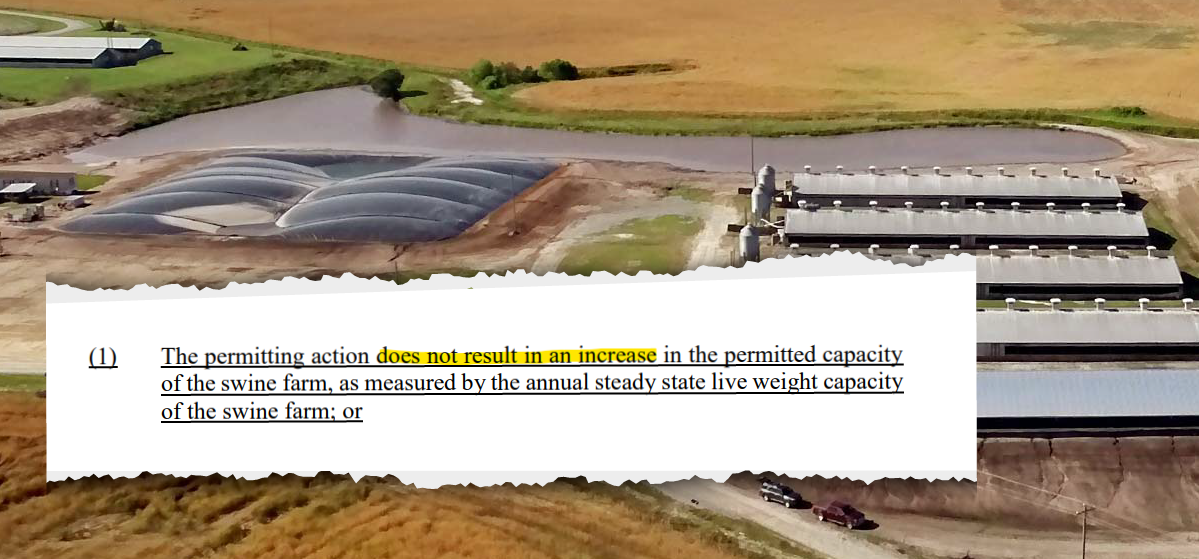
The N.C. Department of Environmental Quality considers a new law to be a codification of the agency’s “long-standing interpretation” of existing law. Photo credit: Align RNG
Capitol Broadcasting Co. and WRAL published multiple falsehoods this week about our industry in an editorial critique of this year’s legislative session, relying on inaccurate opinions of a Duke University professor.
WRAL asserted that North Carolina lawmakers have taken action that is “making previously public records about hog farms secret and giving them a green-light to expand for the first time in 23 years.”
Neither of those things is true.
The source for such misinformation isn’t the law itself, but comes from an opinion piece written for WRAL by a professor who has long been opposed to modern hog farming.
Do hog farms have a green light to expand for the first time in 23 years? No.
What lawmakers did vote for was a provision that ensures a hog farmer can add a covered anaerobic digester on the farm or can add a cover to the farm’s treatment lagoon system. This is good because it allows the farmer to capture methane and provide renewable natural gas to power homes and businesses.
Lawmakers rightly voted to support such progress – as well as specific language also in the provision that says the action is allowed so long as it “does not result in an increase in the permitted capacity of the swine farm.”
Bloomberg News correctly reported that the law’s passage “supports renewable energy generation” and requires farms to “stick to” current “capacity limits.” Bloomberg News also reported that the N.C. Department of Environmental Quality considers the measure to be a codification of the agency’s “long-standing interpretation” of existing law.
It is baffling, then, to see a media organization like WRAL, relying on an advocate’s opinion, wrongly describe the new law as giving a “green light” for expansion when the law itself unequivocally limits the farm’s expansion.
Are hog farm records going to be secret? No.
Hog farms are highly regulated in North Carolina. Hog farm records are widely available and they will still be just one click away.
What’s the mix up? In the legislative session, the N.C. Department of Agriculture did request, and lawmakers agreed, to a confidentiality provision – about soil and water conservation records.
The provision says that certain information collected by local soil and water conservation districts should be held in confidence, with an important caveat: if it is that way under state and federal law, too.
The provision also makes clear that the local soil and water conservation records remain public – that is, not secret – if they are in regard to farmers’ “applications for cost-share assistance and associated contract documents that require the approval of the soil and water conservation district or the Soil and Water Conservation Commission.” The upshot is that this applies to private financial information and similar such business records.
Are these “hog farm” records? No reasonable person would conclude that.
Soil and water conservation projects take place in all variety of agricultural activities all across the state. A cursory review of such projects over the past five years shows they deal with improving croplands, pastures and farm ponds, with stopping runoff, and with all sorts of positive improvements, such as adding oyster reefs, pet waste receptacles, trails and walkways, backyard rain gardens, fencing, and more.
When the soil and water provision was first proposed last year, some fringe activists seemed to think it had something to do with hog farms. But that wasn’t the case; indeed, it’s often the case that those who say much about agriculture actually know little about agriculture.
In the past five years, there were about 8,600 soil and water conservation projects across the state. How many of these conservation projects were on swine farms? At most, some 3.7 percent of them, which turns on its head the idea that these are “hog farm” records.
It is puzzling, then, that WRAL could be duped into reaching such a false conclusion.
The text of the new law isn’t hard to decipher. You can check these items out for yourself by clicking here, and looking at pages 7 and 8.
WRAL won’t correct its errors
What’s more? WRAL’s headline on this misguided attack says that the law’s passage was a result of “legislative partisanship.”
Except, this one wasn’t. The bill is the Farm Act of 2020, an omnibus that includes many provisions on many subjects. Passage of the bill in the legislature included 125 lawmakers in favor – 92 of them Republicans and 33 of them Democrats. Gov. Roy Cooper, a Democrat, signed the bill into law.
That is, the bill passed as a result of legislative bipartisanship – something to celebrate, not scorn.
We recognize that errors and mistakes can happen. No one is perfect. Within hours of publication of these obvious mistakes on Monday, we asked for the errors to be retracted or, at least, corrected. And yet, two days later, WRAL has refused. This is both baffling and puzzling, and we are posting this to at least attempt to set the record straight.
There is a constellation of agenda-driven activist groups in North Carolina who don’t like livestock agriculture. These groups are spending millions to sway the media and the public. Unbound by facts, they aim, over and over, to cause harm to North Carolina farmers.
This is why we all depend on mainstream media outlets – in news columns or opinion pieces – to be rooted in facts and fairness, and in context and clarity.
– Andy Curliss, CEO
